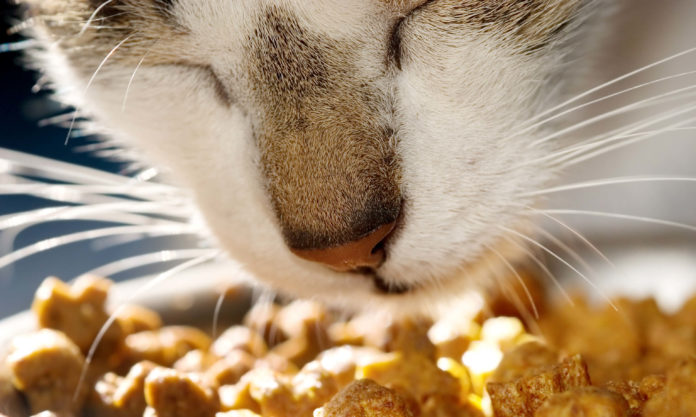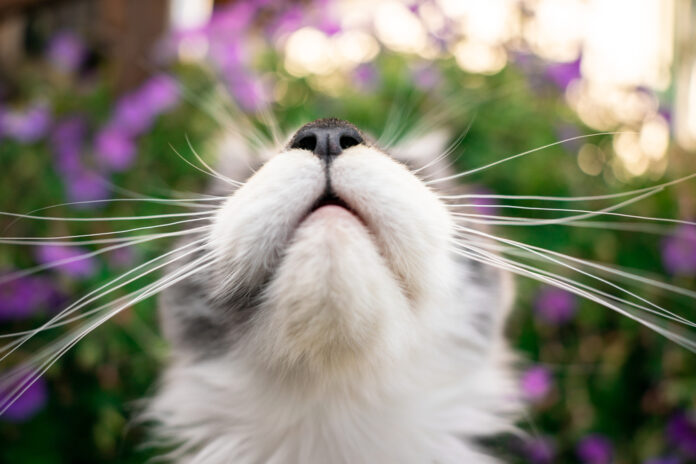Feeding your cat to prevent dental issues

Periodontal disease is extremely common in cats, but the good news is that a healthy diet can help prevent it.
Periodontal disease is one of the most prevalent dental issues in cats. It affects about 70% of cats over two years of age, and 85% of cats over five! Yet despite how incredibly common it is, this condition is actually preventable, and diet is a key factor.
Periodontal disease starts when food remnants and bacteria accumulate, forming sticky plaque around the gum line. That plaque subsequently hardens into tartar. Other than bad breath, there aren’t many obvious early signs of periodontal disease, so the problem is too often left untreated. As a result, far more serious health conditions arise, including painful inflammation, tooth loss, and damage to the heart, liver and kidneys as the inflammation and bacteria gain access to the bloodstream through the diseased gingiva.
Several factors affect the formation of plaque, tartar and the progression of periodontal disease, but diet and eating behavior are major influences.
Commercial “dental” diets don’t work
For years we’ve heard that commercial dry food (kibble) cleans teeth. The theory was that as the pet chewed the kibble, the cracked pieces would rub against the teeth and clean the plaque or tartar. Well, it turns out commercial kibble isn’t all it’s cracked up to be. In fact, many kibble bits are too small to offer any benefit; many cats swallow the pieces whole, so there’s no chance of any abrasive action. Some commercial pet food companies offer “dental” diets made of larger kibble sizes to encourage chewing. But here’s the thing: cats don’t chew their food! Their teeth are designed to tear food into bite-sized pieces, which means once the food is bite-sized, they swallow it whole.
But chewing aside, do larger kibble bits really scrub teeth? “Only if the companies have studies to show they do,” says integrative veterinarian Dr. Katie Kangas. “Companies that say their diets affect tartar do not mean anything to the health of the pet. Visible tartar (calcified plaque) is more of a cosmetic problem; we want the food to actually affect the gumline and gums, which means the studies need to show the food decreases gingivitis, and not just tartar. We now understand that to assess dental health, we need to be looking for inflammation in the gums (redness/swelling/bleeding) rather than dirty teeth (tartar).”
Even if a commercial “dental” diet can claim any effects on gingivitis, you also have to look at the ingredients in the food. If the diet is high in things like corn, brewer’s rice, etc., you’re no further ahead. “These companies say carbohydrate sources can be made into perfectly good proteins for animals, but many people disagree, including me,” says Dr. Kangas. “High carbs are not natural for cats, as they create a pro-inflammatory situation in the whole body, including the gums and mouth. There are much better and more effective options to help keep a cat’s mouth healthy.”
Dental-friendly foods
Cats thrive on moisture-rich grain-free diets, adds Dr. Kangas. Some good options include high quality canned, raw and freeze-dried diets.
“Raw diets would generally be an ideal choice, based strictly on best nutrition choices, but that said, there is no single diet that is right for all cats,” she says. “Most cats will thrive on raw diets, but it may not be the best match for some. For those scenarios, high quality canned food is a great option and it fulfills the requirements for a moisture-rich diet.”
Treats that combat dental issues
As with commercial pet foods, low-end dental treats and chews that make claims for fresher breath and a cleaner mouth don’t work to address gingivitis. Again, any studies these products may have undergone usually only show a decrease in tartar, which isn’t the issue.
The most effective dental treats for cats are those that rub on the gums during consumption, such as raw chicken necks. Never give your cat bones that have been cooked; they are brittle and may easily splinter, causing stomach and intestinal damage.
These supplements can also help
A variety of supplements promote a healthy oral environment and prevent dental issues. Examples include probiotics, natural enzymes, Omega-3 fatty acids and natural food-based antioxidants. These supplements work to reduce oxidative stress and inflammation throughout the body and mouth, says Dr. Kangas. One supplement she recommends is 1-TDC, a natural fatty acid-based product made by Elite Science. “It helps to proactively neutralize inflammation and therefore minimize progression to periodontal disease,” she explains. “It has a big affinity for two tissue types in the body – gums and joints/tendons/ligaments/muscles – so it supports both oral and joint health.”
Just because most cats end up with periodontal disease doesn’t mean yours has to. The key to a healthy mouth is prevention: along with regular veterinary dental care, a high quality, anti-inflammatory diet, raw bones and the right supplements will help keep his teeth and gums in good shape.



